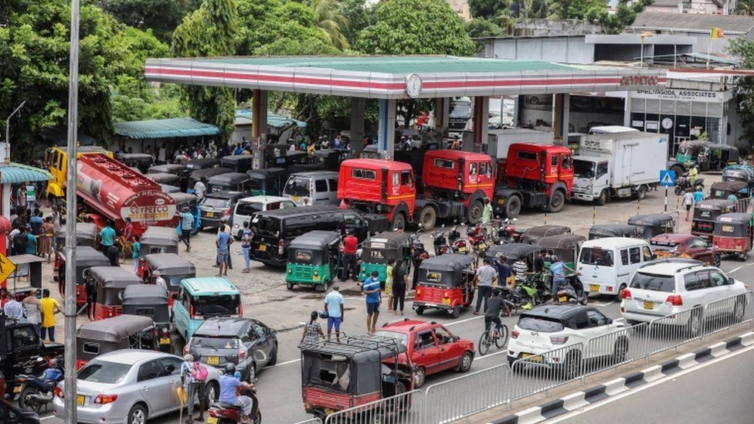Sri Lanka's new prime minister says the country is down to its last day of petrol as it faces its worst economic crisis in more than 70 years.
In a televised address, Ranil Wickremesinghe said the nation urgently needs $75m (£60.8m) of foreign currency in the next few days to pay for essential imports.
He said the central bank will have to print money to pay government wages.
Mr Wickremesinghe also said state-owned Sri Lankan Airlines may be privatised.
The island nation's economy has been hit hard by the pandemic, rising energy prices, and populist tax cuts. A chronic shortage of foreign currency and soaring inflation had led to a severe shortage of medicines, fuel and other essentials.
In the capital Colombo, auto rickshaws, the most popular means of transport in the city, and other vehicles have been queuing at petrol stations.
"At the moment, we only have petrol stocks for a single day. The next couple of months will be the most difficult ones of our lives," said Mr Wickremesinghe, who was appointed prime minister on Thursday.
However, shipments of petrol and diesel using a credit line with India could provide fuel supplies in the next few days, he added.
Mr Wickremesinghe said the country's central bank would have to print money to help meet the government's wage bill and other commitments.
"Against my own wishes, I am compelled to permit printing money in order to pay state-sector employees and to pay for essential goods and services. However, we must remember that printing money leads to the depreciation of the rupee," he said.
He also proposed selling off Sri Lankan Airlines as part of efforts to stabilise the nation's finances. The carrier lost 45 billion Sri Lankan rupees ($129.5m; £105m) in the year ending March 2021.
In recent weeks, there have been large, sometimes violent, protests against President Gotabaya Rajapaksa and his family.
Last week, the president's elder brother Mahinda resigned as prime minister after government supporters clashed with protesters. Nine people died and more than 300 were wounded in the violence.
On Friday, Mr Wickremesinghe told the BBC, that the economic crisis is "going to get worse before it gets better".
In his first interview since taking office, he also pledged to ensure families would get three meals a day.
Appealing to the world for more financial help, he said "there won't be a hunger crisis, we will find food".
Latest Stories
-
‘Menstruation is not a taboo’: North Tongu DCE champions dignity and access for girls
3 minutes -
Revoking Nyaho-Tamakloe’s ‘founding member’ status likely to be considered at NPP NEC meeting – JFK
19 minutes -
Wontumi arrest: Posterity will judge you – Afenyo-Markin tells NDC
40 minutes -
Wontumi arrest: JFK condemns Dr. Nyaho-Tamakloe’s ‘Where is NPP Chairman’ comments
46 minutes -
Bawumia calls for calm amid Wontumi’s detention
54 minutes -
Two dead, others injured in Juaso-Nkawkaw Highway crash
1 hour -
We’re disappointed we didn’t see Wontumi – Dr Bawumia
1 hour -
GH₵50m bail deliberately set to block Wontumi’s release – Bawumia
1 hour -
Ashanti Peace Council urges stakeholders to uphold law and protect national peace
1 hour -
Equipping future healthcare professionals: Cassona Global, Mindray provide free practical training for ATU students
2 hours -
Bawumia, Minority Leader, granted access to Wontumi as tensions mount over detention
2 hours -
World Menstrual Hygiene Day: Terry Yegbe Foundation and Groomdatgirl champion menstrual health education at Horti EP Primary
2 hours -
Watch how Bawumia was forced through violent scuffle as NPP supporters clash with Police
2 hours -
NPP currently has no leadership; where is the Chairman? – Nyaho-Nyaho Tamakloe quizzes over Wontumi arrest
2 hours -
Tensions rise as NPP supporters besiege NIB headquarters over Wontumi’s transfer
2 hours

